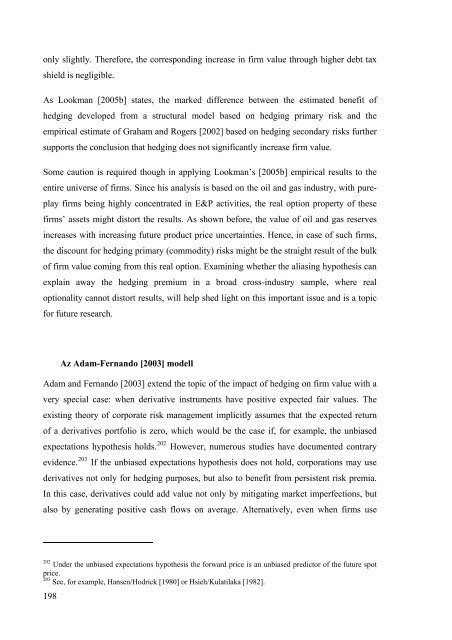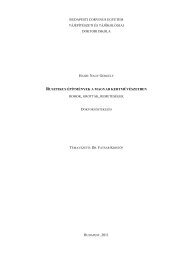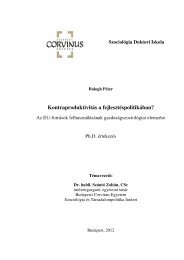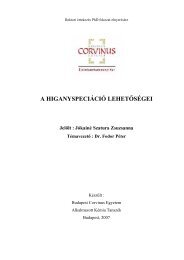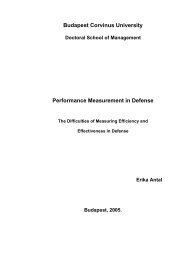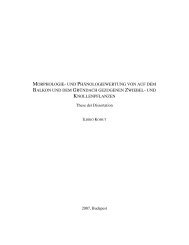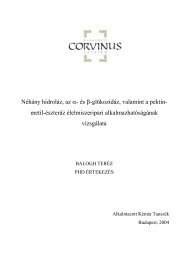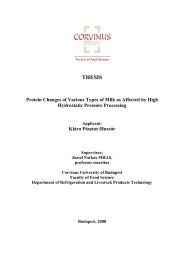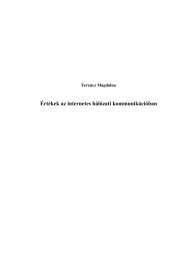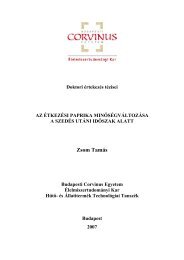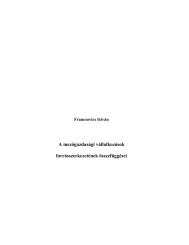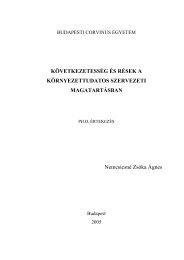értekezés - Budapesti Corvinus Egyetem
értekezés - Budapesti Corvinus Egyetem
értekezés - Budapesti Corvinus Egyetem
You also want an ePaper? Increase the reach of your titles
YUMPU automatically turns print PDFs into web optimized ePapers that Google loves.
only slightly. Therefore, the corresponding increase in firm value through higher debt tax<br />
shield is negligible.<br />
As Lookman [2005b] states, the marked difference between the estimated benefit of<br />
hedging developed from a structural model based on hedging primary risk and the<br />
empirical estimate of Graham and Rogers [2002] based on hedging secondary risks further<br />
supports the conclusion that hedging does not significantly increase firm value.<br />
Some caution is required though in applying Lookman’s [2005b] empirical results to the<br />
entire universe of firms. Since his analysis is based on the oil and gas industry, with pureplay<br />
firms being highly concentrated in E&P activities, the real option property of these<br />
firms’ assets might distort the results. As shown before, the value of oil and gas reserves<br />
increases with increasing future product price uncertainties. Hence, in case of such firms,<br />
the discount for hedging primary (commodity) risks might be the straight result of the bulk<br />
of firm value coming from this real option. Examining whether the aliasing hypothesis can<br />
explain away the hedging premium in a broad cross-industry sample, where real<br />
optionality cannot distort results, will help shed light on this important issue and is a topic<br />
for future research.<br />
Az Adam-Fernando [2003] modell<br />
Adam and Fernando [2003] extend the topic of the impact of hedging on firm value with a<br />
very special case: when derivative instruments have positive expected fair values. The<br />
existing theory of corporate risk management implicitly assumes that the expected return<br />
of a derivatives portfolio is zero, which would be the case if, for example, the unbiased<br />
expectations hypothesis holds. 202 However, numerous studies have documented contrary<br />
evidence. 203 If the unbiased expectations hypothesis does not hold, corporations may use<br />
derivatives not only for hedging purposes, but also to benefit from persistent risk premia.<br />
In this case, derivatives could add value not only by mitigating market imperfections, but<br />
also by generating positive cash flows on average. Alternatively, even when firms use<br />
202 Under the unbiased expectations hypothesis the forward price is an unbiased predictor of the future spot<br />
price.<br />
203 See, for example, Hansen/Hodrick [1980] or Hsieh/Kulatilaka [1982].<br />
198


